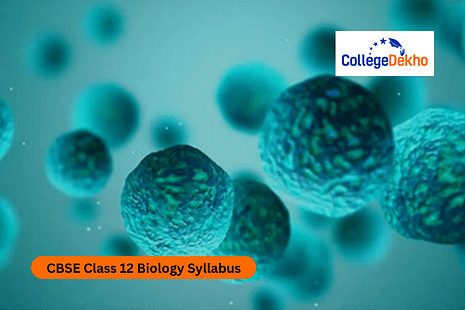CBSE Class 12 Biology Syllabus 2025 was published on March 23, 2024, on its official website. Students can find the CBSE Class 12th Biology Syllabus pdf along with the marking scheme for the AY 2024-25.
- CBSE Class 12 Biology Syllabus 2025 PDF
- CBSE Class 12 Biology Syllabus 2025 - Course
- CBSE Class 12 Biology Marking Scheme 2025
- CBSE Class 12 Biology Question Paper Pattern 2025
- CBSE Class 12 Biology Deleted Syllabus 2025
- CBSE Class 12 Biology Prescribed Books
- How to Download CBSE Class 12 Biology Syllabus 2025
- Faqs


Never Miss an Exam Update
CBSE Class 12 Biology Syllabus 2025
: The Central Board of Secondary Education released the CBSE Class 12 Biology Syllabus 2025 on March 23, 2024, at www.cbseacademic.nic.in. The
CBSE Class 12 Syllabus 2025
will provide the students with updated concepts and the latest marking scheme of the subject. As per the Biology Class 12 Syllabus 2025, the Biology paper will comprise 100 marks altogether. Wherein, 70 Marks will be given on theory paper and the remaining 30 Marks will be given on Practical. There are a total of 5 units and 15 chapters in the CBSE 12th Biology syllabus 2025. The practical exam is divided into 4 parts. Students will be given marks for familiarity with the apparatus, written exam, practical, and viva.
CBSE has recommended the NCERT book for class 12 biology preparation. Along with the syllabus Central Board of Secondary Education has made available the
CBSE Class 12 Exam Pattern 2025
.
Students need to make sure that they complete as many
CBSE 12th Biology sample papers
and
CBSE Class 12 Biology previous years' question papers
as possible to self-evaluate their preparation after reviewing the entire syllabus and the CBSE Exam Pattern. Read the article to know more about the detailed CBSE Class 12 Biology Syllabus 2025.
Also Read: CBSE Class 12 Result 2025
CBSE Class 12 Biology Syllabus 2025 PDF
Students can download the CBSE Class 12 Biology Syllabus for the academic session 2025 and start their preparation.
CBSE Class 12 Biology Syllabus 2025 - Course
Class 12 Biology covers various important topics, such as cell structure and function, ecology, biotechnology, genetics, and human physiology. Check the detailed CBSE Class 12 Biology syllabus here.
Unit-VI Reproduction
Chapter-2: Sexual Reproduction in Flowering Plants
Flower structure; development of male and female gametophytes; pollination - types, agencies and examples; out breeding devices; pollen-pistil interaction; double fertilization; post fertilization events - development of endosperm and embryo, development of seed and formation of fruit; special modes- apomixis, parthenocarpy, polyembryony; Significance of seed dispersal and fruit formation.
Chapter-3: Human Reproduction
Male and female reproductive systems; microscopic anatomy of testis and ovary; gametogenesis -spermatogenesis and oogenesis; menstrual cycle; fertilisation, embryo development upto blastocyst formation, implantation; pregnancy and placenta formation (elementary idea); parturition (elementary idea); lactation (elementary idea).
Chapter-4: Reproductive Health
Need for reproductive health and prevention of Sexually Transmitted Diseases (STDs); birth control - need and methods, contraception and medical termination of pregnancy (MTP); amniocentesis; infertility and assisted reproductive technologies - IVF, ZIFT, GIFT (elementary idea for general awareness).
Unit-VII Genetics and Evolution
Chapter-5: Principles of Inheritance and Variation Heredity and variation
Mendelian inheritance; deviations from Mendelism – incomplete dominance, co-dominance, multiple alleles and inheritance of blood groups, pleiotropy; elementary idea of polygenic inheritance; chromosome theory of inheritance; chromosomes and genes; Sex determination - in humans, birds and honey bee; linkage and crossing over; sex linked inheritance - haemophilia, colour blindness; Mendelian disorders in humans - thalassemia; chromosomal disorders in humans; Down's syndrome, Turner's and Klinefelter's syndromes.
Chapter-6: Molecular Basis of Inheritance
Search for genetic material and DNA as genetic material; Structure of DNA and RNA; DNA packaging; DNA replication; Central Dogma; transcription, genetic code, translation; gene 8 expression and regulation - lac operon; Genome, Human and rice genome projects; DNA fingerprinting.
Chapter-7: Evolution
Origin of life; biological evolution and evidences for biological evolution (paleontology, comparative anatomy, embryology and molecular evidences); Darwin's contribution, modern synthetic theory of evolution; mechanism of evolution - variation (mutation and recombination) and natural selection with examples, types of natural selection; Gene flow and genetic drift; Hardy - Weinberg's principle; adaptive radiation; human evolution.
Unit-VIII Biology and Human Welfare
Chapter-8: Human Health and Diseases
Pathogens; parasites causing human diseases (malaria, dengue, chikungunya, filariasis, ascariasis, typhoid, pneumonia, common cold, amoebiasis, ring worm) and their control; Basic concepts of immunology - vaccines; cancer, HIV and AIDS; Adolescence - drug and alcohol abuse. Chapter-10: Microbes in Human Welfare Microbes in food processing, industrial production, sewage treatment, energy generation and microbes as bio-control agents and bio-fertilizers. Antibiotics; production and judicioususe.
Unit-IX Biotechnology and its Applications
Chapter-11: Biotechnology
Principles and Processes Genetic Engineering (Recombinant DNA Technology).
Chapter-12: Biotechnology and its Applications
Application of biotechnology in health and agriculture: Human insulin and vaccine production, stem cell technology, gene therapy; genetically modified organisms - Bt crops; transgenic animals; biosafety issues, biopiracy and patents.
Unit-X Ecology and Environment
Chapter-13: Organisms and Populations
Population interactions - mutualism, competition, predation, parasitism; population attributes - growth, birth rate and death rate, age distribution. (Topics excluded: Organism and its Environment, Major Aboitic Factors, Responses to Abioitic Factors, Adaptations) 9
Chapter-14: Ecosystem
Ecosystems: Patterns, components; productivity and decomposition; energy flow; pyramids of number, biomass, energy (Topics excluded: Ecological Succession and Nutrient Cycles).
Chapter-15: Biodiversity and its Conservation
Biodiversity-Concept, patterns, importance; loss of biodiversity; biodiversity conservation; hotspots, endangered organisms, extinction, Red Data Book, Sacred Groves, biosphere reserves, national parks, wildlife, sanctuaries and Ramsar sites.
CBSE Class 12 Biology Marking Scheme 2025
The table below includes the marks for the CBSE Class 12 Biology theory exam. Students can find out the important chapters according to the marks allotted to them, and prepare accordingly for board exams.
Topics | Marks |
|---|---|
Reproduction | 16 |
Genetics and Evolution | 20 |
Biology and Human Welfare | 12 |
Biotechnology and its Applications | 12 |
Ecology and Environment | 10 |
Total Marks | 70 |
CBSE conducts Class 12 Biology practical exam for 30 marks. The distribution of marks is presented in the table below:
Evaluation Scheme | Marks |
|---|---|
One Major Experiment (5) | 5 |
One Minor Experiment (2 & 3) | 4 |
Slide Preparation (1 & 4) | 5 |
Spotting | 7 |
Practical Record + VIVA Voce | 4 |
Investigatory Project and its Project Record + VIVA Voce | 5 |
Total Marks | 30 |
List of Experiments
- Make a temporary mount to observe pollen germination.
- Through the quadrat method, study the plant population density.
- Prepare a temporary mount of onion root tip to study mitosis.
- Isolate DNA from available plant material such as spinach, green pea seeds, papaya, etc.
| Topic | Marks |
|---|---|
| Identification/Familiarity with the apparatus | 5 |
| Written test (Based on given/prescribed practicals) | 10 |
| Practical Records | 5 |
| Viva | 10 |
| Total | 30 |
CBSE Class 12 Biology Question Paper Pattern 2025
Biology paper carries 70 marks for theory and 30 marks for practical. Tabulated below is the updated CBSE class 12 exam pattern for Biology.Question Paper Design (Theory) 2025 | |
|---|---|
Competencies | |
Demonstrate the Knowledge and Understanding | 50% |
Application of Knowledge / Concepts | 30% |
Analyse, Evaluate and Create | 20% |
- Types of questions: Source-based, Case-based, Passage-based, Integrated assessment questions; SA; Assertion-Reasoning type questions; VSA with MCQs.
- There would be an internal choice of about thirty-three percent.
- Demonstrate, Knowledge and Understanding State, name, list, identify, define, suggest, describe, outline, summarize, etc.
- Application of Knowledge/Concepts Calculate, illustrate, show, adapt, explain, distinguish, etc.
- Analyze, Evaluate and Create Interpret, analyse, compare, contrast, examine, evaluate, discuss, construct, etc.
CBSE Class 12 Biology Deleted Syllabus 2025
Go through the list of deleted topics in the CBSE Class 12 Biology syllabus in the theory paper. The page numbers are provided along with the topics:
Chapter | Page No. | Dropped Topics/Chapters |
|---|---|---|
Chapter 1: Reproduction in Organisms | 3–18 | Full Chapter |
Chapter 9: Strategies for Enhancement in Food Production | 165–176 178 | Full Chapter |
Chapter 13: Organisms and Populations | 220 221–222 223–225 225–226 250–252 253–254 254–255 255 | 13.1 Organism and Its Environment 13.1.1 Major Abiotic Factors 13.1.2 Responses to Abiotic Factors 13.1.3 Adaptations Summary (para 2) Ques. 1, 2, 3, 9, 10, 11, 12 14.6 Ecological Succession 14.6.1 Succession of Plants 14.7 Nutrient Cycling 14.7.1 Ecosystem – Carbon Cycle 14.7.2 Ecosystem – Phosphorus Cycle 14.8 Ecosystem Services |
Chapter 16: Environmental Issues | 270–286 | Full Chapter |
In addition to theory, some topics are eliminated from the CBSE Class 12 practical exam too. Check out the topics to be avoided.
Unit & Chapter | Deleted Topic |
|---|---|
Unit-VI Reproduction Chapter-1: Reproduction in Organisms | (whole chapter deleted) |
Unit-VIII Biology and Human Welfare Chapter-9: Strategies for Enhancement in Food Production | (whole chapter deleted) |
Unit-X Ecology and Environment Chapter-13: Organisms and Populations | Organism and its Environment, Major Aboitic Factors, Responses to Abioitic Factors, Adaptations |
Unit-X Ecology and Environment Chapter-14: Ecosystem | Ecological Succession and Nutrient Cycles |
PRACTICALS A. List of Experiments | 2. Collect and study soil from at least two different sites and study them for texture, moisture content, pH and water holding capacity. Correlate with the kinds of plants found in them. 3. Collect water from two different water bodies around you and study them for pH, clarity and presence of any living organism. 4. Study the presence of suspended particulate matter in air at two widely different sites. 8. Study the effect of different temperatures and three different pH on the activity of salivary amylase on starch. |
PRACTICALS B. Study/observation of the following (Spotting) | 10. Two plants and two animals (models/virtual images) found in xeric conditions. Comment upon their morphological adaptations. 11. Two plants and two animals (models/virtual images) found in aquatic conditions. Comment upon their morphological adaptations. |
CBSE Class 12 Biology Prescribed Books
Students of CBSE 12th science stream must follow the NCERT Books for Biology. Other than these, students can refer to other reference books as well for better preparation. Some of the CBSE Class 12 Biology prescribed books are:
- Biology, Class-XII, Published by NCERT
- Other related books and manuals brought out by NCERT (consider multimedia also)
- Biology Supplementary Material (Revised). Available on the CBSE website.
How to Download CBSE Class 12 Biology Syllabus 2025
Students can visit the official website of the CBSE Board to download the CBSE Class 12 Biology Syllabus 2025. To download the syllabus online, they can follow the steps given below:
- Step 1: Visit the official website of CBSE at cbseacademic.nic.in.
- Step 2: From the overview page, look for the ‘Curriculum’ tab.
- Step 3: Select the ‘Senior Secondary Curriculum (XI-XII)’ option.
- Step 4: Then select Academic Electives (Group A).
- Step 5: Select the Biology syllabus. The Biology curriculum for class 12 CBSE will appear on the screen. Save the syllabus as a PDF.
General Guidelines
In the practical examination, students will get a two-hour duration. The question paper will include 15 practical skill-based very short answer-type questions. Out of this, 10 questions will have to be answered by students. The questions should be based on the listed practicals. Students should aim to answer every question within two minutes.
In the practical file, students are expected to record at least five experiments. They must follow the correct format of writing an experiment in the practical file, which includes aim, apparatus required, simple theory, procedure, related practical skills, precautions, etc. These practicals will be checked and signed by the internal examiner. During the viva, questions may be generated based on basic theory/principle/concept, apparatus/materials/chemicals required, procedure, precautions, sources of error etc.
FAQs
Students can refer to the previous year question papers to prepare for the Biology exam. They can check the questions and focus on the pattern of questions.
CBSE Class 12 Biology practical exam is conducted for 30 marks. Students should effectively prepare for the project, viva, slide, and more to increase the overall marks in board exams.
Students can check the CBSE Class 12 Biology syllabus to know the marks weightage. Among all the Units, Genetics and Evolution has the highest weightage. Students can pay more attention to this unit.
By visiting the official website, students can get the CBSE Class 12th Biology syllabus in PDF format. Students can download the PDF file and prepare for board exams.
Students can go through the NCERT book prescribed by the CBSE. The book includes a complete syllabus for class 12th. Students can prepare the topics for board exams.
Was this article helpful?

























